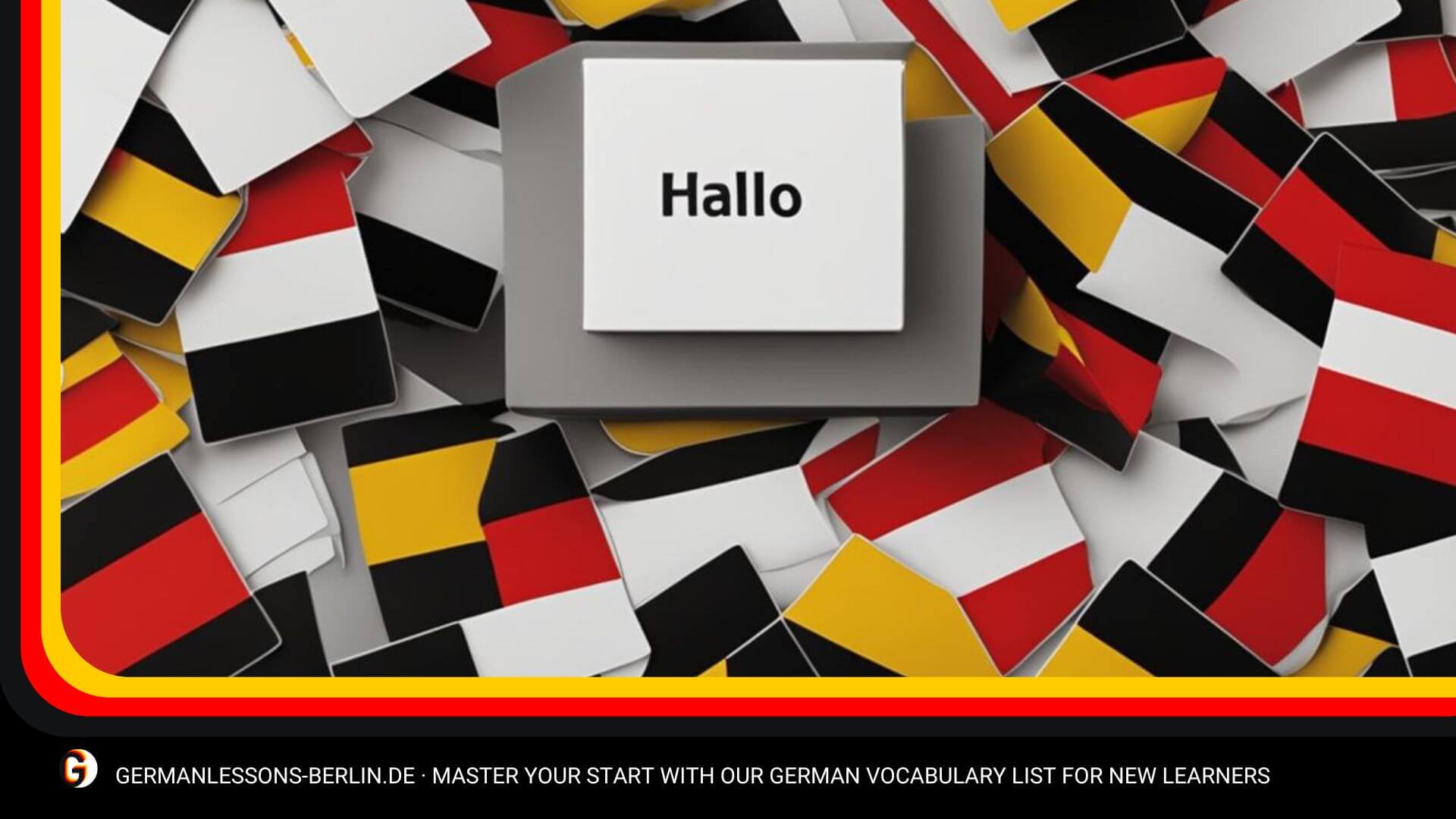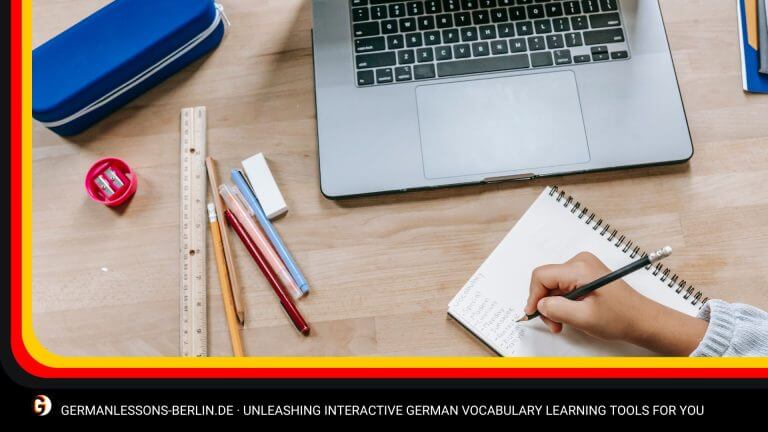Table of Contents
I remember the first time I dove into the German language—those umlauts (ä, ö, ü), and the enigmatic Eszett (ß) seemed thoroughly mysterious. And let’s not even start on the brisk pace of native speakers. But I soon discovered something comforting about German: many essential German words are simple building blocks, smaller words that piece together like a linguistic Lego set to create complex meanings. Take “Kühlschrank” for example, essentially a “cool cupboard” which whimsically means refrigerator. Such charming discoveries are what make the German Vocabulary List for New Learners not only practical but delightful to explore. As a beginner in German vocabulary, I’ve learned that these fundamentals are essential stepping stones, enabling you to bridge the gap toward more expressive and complex communication.
So, if you’re embarking on this linguistic journey, don’t let the seemingly steep hill discourage you. Beyond the basics, German is a language rich with compound words that often make logical sense, giving your brain a helpful pattern to latch onto. In other words, getting to grips with essential German words right away can turn a daunting task into a series of small, confidence-building triumphs.
Key Takeaways
- Starting with a basic German vocabulary list is crucial for new learners.
- Understanding the function of umlauts and the Eszett is key to mastering pronunciation.
- Compound words in German can simplify the learning process by combining familiar elements.
- Remember that beginner German vocabulary sets the foundation for future fluency.
- The essentials of German, like nouns and verbs, enable you to understand and form basic sentences.
- Developing a strong German vocabulary list for new learners enriches communication and comprehension.
The Importance of Basic German Vocabulary for Beginners
When I first started to learn German vocabulary, I was keenly aware of how crucial a strong foundation is. It’s much like learning to play an instrument; you have to start with the basics before you can play complex symphonies. For those of us keen on the German language, possessing a basic German vocabulary is akin to holding the keys to a treasure chest filled with linguistic riches. It is with these keys that we begin to unlock the full potential of communication, allowing us to progress confidently from rudimentary expressions to more advanced dialogue and comprehension.
Consider this: the initial words and phrases you commit to memory are not just standalone elements. They are, in essence, the puzzle pieces that will connect to form the bigger picture of fluency. Whether it’s ordering a Kaffee in a cozy Berlin café or navigating the bustling streets of Munich, the fundamental blocks of the German language vocabulary list form the crucial stepping-stones on your journey to mastery. Indeed, it is with these blocks that the walls of language barriers are dismantled, brick by brick.
My own experiences have taught me that knowing how to properly use pronouns, numbers, and basic nouns can dramatically improve one’s ability to understand and communicate effectively in German. Pronouns are the chameleon words that replace names and nouns, numbers are the universal language of quantity and order, and nouns are the solid subjects that populate our sentences with meaning.
Each word you learn in German lights up a new shade of meaning and understanding, enriching your comprehension of this logical and expressive language.
As we delve into basic German vocabulary for beginners, we see how each word serves as a building block, setting us up for success in complex contexts. Below is a list of essentials categorized to guide you as you pave your initial pathway through the language.
| Category | Examples |
|---|---|
| Pronouns | ich (I), du (you), er/sie/es (he/she/it) |
| Numbers | eins (one), zwei (two), drei (three) |
| Common Nouns | Tag (day), Nacht (night), Mann (man) |
Immersing oneself in these basics catalyzes the learning process—turning daunting tasks into approachable challenges. Take, for instance, the poetic simplicity of the pronouns ‘ich’, ‘du’, and ‘sie’, which become the rhythm in countless sentences. Or ponder the ease with which numbers pave the way for transactions, schedules, and storytelling. And let’s not forget the nouns, representing tangible and intangible concepts that fill our lives and conversations.
- Basic pronouns are essential for initiating any dialogue.
- Understanding numbers creates a framework for dates, times, and quantities.
- Recognizing common nouns helps identify objects, people, and places.
As I continue to learn German vocabulary, I’m reminded that language is more than just a tool—it’s a passport to understanding a culture, a way of thinking, and a means to connect. The joy of adding one more noun, one more verb, and one more pronoun to my fledgling German lexicon is indescribably satisfying. So, as you embark on this linguistic endeavor, take it one word at a time, and you’ll soon find yourself stringing together sentences that were once foreign to your tongue.
Discovering the German Alphabet and Pronunciation
Welcome to our delightful exploration of the German language’s foundations, where we decode the mysteries of the German alphabet and its pronunciation. As I embarked on my own journey to learn German, I quickly realized that understanding the alphabet is the key to unlocking the door to proper German pronunciation. In particular, the unique characters known as German umlauts and the Eszett can initially seem daunting. Now, let’s demystify these characters together!
Umlauts and Eszett: Navigating Unique German Characters
In the German alphabet, you’ll encounter the umlauts: ä, ö, and ü. These are not just decorative; they change the way you pronounce the associated vowels. Grasping this concept was my first leap towards understanding authentic German pronunciation. Then, there’s the Eszett (ß), a character that represents a sharp “s” sound, typically following long vowels or diphthongs. Learning the proper use of these characters is not only fun but also crucial for speaking German like a native.
For example, let’s consider the word “groß” meaning “big” or “large.” Notice the double “s” sound? It’s crisply articulated, a bit different from your average ‘s’ sound, but with practice, it becomes second nature. Each umlauted vowel and Eszett is a nuanced hue in the linguistic tapestry of the German language.
Getting the Hang of German Phonetics
Moving beyond the alphabet, German phonetics involves a spectrum of sounds, some of them peculiar to English speakers. Yet, these sounds are integral to speaking German with precision and flair. Early practice with commonly used words and sounds, such as the guttural “ch” in “ich” (I) or “Buch” (book), or the rolled “r” in “rot” (red), profoundly enhances your pronunciation skills. In time, these sounds will roll off your tongue with ease.
Dive into the German pronunciation with curiosity, and soon, every ‘ächzen’ (groan) and ‘möchten’ (would like) will be part of your growing linguistic repertoire.
Remember, the difference between “schon” (already) and “schön” (beautiful), or “mussen” (to have to) and “müssen” (must), is not just a matter of dots above a letter; it’s a matter of contextual and phonetic precision that can change the meaning of what you say. Embracing these nuances is what truly enriches your communication.
Exploring phonetic elements also brings attention to the number 4, or “vier” in German. Here’s a good phonetic exercise: it’s pronounced with a “f” sound at the beginning, reminiscent of “fear” in English but with a doppelgänger ‘v’. Practicing numbers is a practical and universally relevant way to hone your pronunciation, given their frequent use in daily conversation.
- An understanding of umlauts enhances your ability to differentiate words that may seem similar.
- Practicing the Eszett will help you master one of the quintessential sounds of the German language.
- Focusing on commonly used words gives you immediate tools to practice and perfect your pronunciation.
To sum up, each character in the German alphabet carries its own sonic identity—a treasure of sounds that, once mastered, will allow you to articulate words with confidence and clarity. So, embark on this phonetic quest with enthusiasm, and let the rhythm of the German language guide you to fluency.
Essential Pronouns and Introductions in German
When I first embarked on my language journey, grasping the usage of German pronouns was a game-changer in effectively introducing myself in German and creating a connection with others. The power of pronouns lies in their ability to substitute nouns, paving the way for more dynamic and personal conversations.
Let’s dive into personal pronouns, the unsung heroes of our daily discourse. Starting with ‘ich’ (I), a cornerstone of self-introduction, and moving to ‘du’ (you), we build the foundation of interpersonal communication. Then comes ‘sie’, elegant in its duality, serving as both ‘she’ and the formal ‘you’. Together, they constitute an essential trio for those looking to navigate the Germanic waters of interaction.
But the world of pronouns doesn’t end there. Demonstrative pronouns like ‘dieses’ (this) and ‘jene’ (those) anchor our dialogue to the here and now, pointing out specific entities in our bustling environments. Interrogative pronouns like ‘wer’ (who) and ‘was’ (what) transform our sentences into questions, invigorating exchanges with the spirit of curiosity.
Mastering German pronouns opened up a new realm of clarity in my sentences. It’s like being handed the secret key to unlocking a treasure trove of conversational fluency.
As you begin to cozy up to these linguistic companions, let me share a handy table that lines up the most common German pronouns with their English counterparts. The table showcases personal, demonstrative, and interrogative pronouns—a launchpad for your expedition into the language.
| English | German (Personal) | German (Demonstrative) | German (Interrogative) |
|---|---|---|---|
| I | ich | dieser/diese/dieses | wer (who) |
| you (informal) | du | jener/jene/jenes | was (what) |
| he | er | – | welche (which) |
| she | sie | – | – |
| it | es | – | – |
| we | wir | – | – |
| you (formal) | Sie | – | – |
| they | sie | – | – |
Now, remember: practice is the bridge between learning and mastery. Incorporate these pronouns in simple self-introduction phrases, and before you know it, the words will emerge from your mouth as naturally as they do in your thoughts. For example, the sentence “I am learning German” can be simply said as “Ich lerne Deutsch.” Tackling pronouns at the outset breathes life into your dialogue and sets a strong precedent for future communicative victories.
- Becoming comfortable with German pronouns is crucial for making proper introductions and connecting with others.
- Use interrogative pronouns to ask questions and engage in more interactive communication.
- Practice by integrating these pronouns in introducing yourself in German and other basic sentences.
So, embrace the challenge! Relish in the satisfaction of splicing together pronouns, verbs, and nouns for that perfect sentence which will open countless doors on your linguistic journey. And when someone asks about your language skills, you’ll confidently reply, “Ich spreche Deutsch!” (I speak German!).
Fundamental German Verbs to Kickstart Your Fluency
When I began my quest to grasp the German language, I learned an indispensable truth: fluency begins with verbs. These action words are the heart of most German sentences, setting the stage for dynamic interactions. Grasping verbs like “sein” (to be), “haben” (to have), and “gehen” (to go) means unlocking the door to forming basic, yet powerful sentences. They are not just words but the very pillars upon which speaking German rests.
Consider the verb “sein,” a chameleon in the language that adapts to various contexts, characterizing states of being and existence. Transitioning to “haben,” we enter the realm of possession and ownership, exploring what it means to have or to hold. And with “gehen,” the movement takes center stage—going, walking, moving forward. These German verbs are more than linguistic terms; they’re symbols of life’s actions and experiences.
Pure mastery of German verbs is akin to a musician understanding scales; they are the base from which the music of dialogue is composed.
I cannot overstate how using these verbs accurately can significantly enhance your ability to create meaningful and expressive German sentences. To show you what I mean, let’s look at a table outlining these fundamental verbs, their English equivalents, and simple sentence constructions to illustrate their use in practical scenarios.
By incorporating these verbs into your everyday conversations, not only will you be speaking German with greater ease, but you’ll also be weaving the fabric of genuine human connection with every word uttered.
| German Verb | English Equivalent | Example Sentence in German | English Translation |
|---|---|---|---|
| sein | to be | Ich bin glücklich. | I am happy. |
| haben | to have | Sie hat ein Buch. | She has a book. |
| gehen | to go | Wir gehen ins Kino. | We are going to the cinema. |
As my own German language skills continue to bloom, I find myself returning to these verbs time and again. They are not just entries in a vocabulary list; they are the companions I rely on to navigate a world where actions truly do speak louder than words. And if you’re just starting out, trust that these verbs will elevate your German sentences from fragmented thoughts to coherent narratives that resonate with clarity and intention.
- Remember that repetition is the mother of learning; the more you use these verbs, the more deeply ingrained they will become in your language repertoire.
- Break down barriers in communication by frequently practicing these verbs in context—it’s the tried-and-true method for mastering the art of speaking German.
- Aim to create simple yet varied sentences using these verbs to build versatility in your expression.
And so, my fellow language enthusiasts, I invite you to embrace these German verbs as the driving force behind your evolving fluency. Let them inspire you to craft sentences with newfound confidence—a testament to the magic that unfolds when we make speaking German a part of our daily lives.
Nailing the Numbers: Counting in German
Counting in German is an invigorating exercise that ignites the neurons as you align numbers with their unique German sounds. For me, learning the German numbers 1-10 was an essential step, paving the path to numerical fluency that serves countless day-to-day purposes from buying pretzels at the bakery to setting up meetings. So, let’s jump right in and discover the simplicity and rhythm of German numbers, and how to pronounce them as if I were chatting with a local at the vibrant Wochenmarkt (weekly market).
Learning Numbers 1-10 with Pronunciation Tips
One might think of numbers as the universal constants amidst the flux of language, yet each tongue twines its unique melodic essence around them. Here’s my snapshot of how to effortlessly count from eins to zehn, and sound like I’ve been doing it mein ganzes Leben (my whole life).
- Eins (ine-z) as in shine without the sh-
- Zwei (tsvy) like saying “try” but with a z-
- Drei (dry) almost English “dry” with a rolled ‘r’
- Vier (feer) imagine “fear” with an accented V
- Fünf (foonf) like “hoof” but starting with an F
- Sechs (zeks) say “sex” with the spirit of a hissing cat
- Sieben (zee-ben) as if combining “see” with “bin”
- Acht (ahkt) the A sounds as in “father”, plus a throaty ending
- Neun (noyn) rhymes with coin, but start it with an N
- Zehn (tsayn) blend “pain” with a hissy Z
Dialing in on the right accent when counting in German immerses you into the culture with a number-crunching crispness that is music to German ears.
In line with these tips, let’s examine a table that outlines each number with its respective German counterpart. Notice the patterns, appreciate the logic, and savor the cadence as if it were a Bavarian folk song.
| Number | German | Pronunciation Hint |
|---|---|---|
| 1 | eins | Shine without the sh- |
| 2 | zwei | Try with a z- |
| 3 | drei | Roll the r in dry |
| 4 | vier | V version of fear |
| 5 | fünf | Hoof with an F |
| 6 | sechs | Sex with more hiss |
| 7 | sieben | See meets bin |
| 8 | acht | ‘Father’ A with a throaty K |
| 9 | neun | Coin starting with N |
| 10 | zehn | Pain with a hissy Z |
In my journey, counting in German has transcended being a mere exercise; it’s a celebration of language in its numerical charm. So, embrace each number as a cherished friend, because whether you’re at the market or making plans, each one holds the key to clearer communication.
German Nouns: Building Blocks for Your Vocabulary
My journey into the heart of the German language has taught me the importance of German nouns. These are the sturdy bricks that construct our dialogue, from the basics like “Mann” (man), “Frau” (woman), and “Kind” (child) to the colorful stones of “Apfel” (apple) and “Brot” (bread) that add variety to the linguistic structure we are building. A sound vocabulary list for German learners must include a vast array of nouns to enable conversations across diverse topics and settings. To a beginner, the selection of German words for beginners might seem limited, but once you start collecting nouns in your mental lexicon, you’ll find yourself increasingly able to discuss a wide range of subjects.
Let’s delve into categories of nouns quintessential for daily communication in German. Familiarity with these will not only help you articulate sentences but will also enrich your understanding of German culture and day-to-day life.
Navigating through essential everyday conversations in German is made seamless by the adept use of nouns, as they form the backbone of most sentences and interactions.
- Time-related nouns aid in scheduling and organizing our lives.
- Profession nouns are useful for describing occupations.
- Location nouns help in navigating cities and places.
- Food nouns are essential for those delicious moments in cafes and supermarkets.
Here’s a closer look at these categories with examples that highlight the harmonious blend of familiarity and new discovery that German offers:
| Category | Examples |
|---|---|
| Time-related Nouns | Stunde (hour), Minute (minute), Tag (day), Nacht (night) |
| Professions | Lehrer (teacher), Arzt (doctor), Bäcker (baker) |
| Locations | Bahnhof (train station), Supermarkt (supermarket), Universität (university) |
| Food | Käse (cheese), Gemüse (vegetables), Schokolade (chocolate) |
Each noun you add to your vocabulary lights up a path, leading you to conversations and connections. I remember my first full sentence spoken at a grocery store; “Ich möchte zwei Äpfel und ein Stück Käse, bitte” (I would like two apples and a piece of cheese, please) was a small victory, emboldening me to continue expanding my list of German nouns. In these moments, the German words for beginners transition from entries on a vocabulary list to real, tangible pieces of life and interaction.
As you continue to learn and grow in your German prowess, keep in mind that these nouns are more than just words; they are your tools to unlocking the rich tapestry of German culture. One word at a time, my friends, and you too will find joy and success on your language-learning expedition.
Adding Flavor with Adjectives: Describing Your World in German
When I started to weave sentences together in German, I realized the true power of adjectives. These descriptive words are like the paint on a canvas, giving life and emotion to the otherwise bare structures of language. Understanding the use of German adjectives when describing in German has allowed me to articulate the size of something as being groß or klein or express the quality of a moment as schön or even langweilig. It’s the spice that turns a bland sentence into a vivid description that resonates with the listener.
Diving into German adjectives opened up an expressive world where I could talk about the warm Sonne or the crisp Luft. Whether I’m recounting the spannende book I read or describing a friend as intelligent and freundlich, adjectives empower me to share not just what happened, but how it felt and the essence of the experience.
Descriptive Words for People, Places, and Things
To truly capture the essence of our surroundings and experiences, it’s necessary to have a robust selection of adjectives at our disposal. The right adjective can transform a simple narrative into an engaging story, rich with imagery and emotion. Here’s how I categorize adjectives into practical themes for everyday conversations:
- Size and Shape: From towering mountains to tiny insects, every object has a dimension worth describing.
- Quality and Condition: I often describe the decadent flavor of a meal or the aged patina of an antique.
- Emotions and Personality: Whether a person, a pet, or even a day, each carries a mood or characteristic.
- Weather and Temperature: No small talk is complete without a mention of the weather, whether it’s kalt or sonnig.
Here is a handy table that I use to remember some of the most widely applicable German adjectives:
| English | German (Size & Shape) | German (Quality & Condition) | German (Emotions) | German (Weather) |
|---|---|---|---|---|
| Big | groß | ausgezeichnet (excellent) | fröhlich (happy) | sonnig (sunny) |
| Small | klein | mangelhaft (deficient) | traurig (sad) | regnerisch (rainy) |
| Round | rund | neu (new) | begeistert (excited) | neblig (foggy) |
| Thin | dünn | altmodisch (old-fashioned) | wütend (angry) | windig (windy) |
| Smooth | glatt | zart (delicate) | entspannt (relaxed) | kalt (cold) |
Incorporating German adjectives into your sentences paints a picture that is worth a thousand words, turning simple chats into memorable narratives.
Take a moment to think about how you would describe your favorite place or a cherished memory. By selecting expressive German adjectives that depict various facets of your experience, you start creating images not just in your mind, but in the minds of those you share with. It’s a linguistic brushstroke that adds depth and texture to the tapestry of communication.
Piecing Together Sentences with German Conjunctions
When I first grappled with structuring German sentences, I quickly grasped the pivotal role of German conjunctions. These are the subtle yet powerful threads that weave individual words into the vibrant tapestry of comprehensive expression. Conjunctions like “und”, “aber”, “weil”, and “also” serve as the glue combining thoughts, allowing for complexity and nuance in the sentences we construct. It’s like discovering the secret to a once cryptic crossword puzzle—suddenly, everything fits into place.
A conjunction such as “und” (and) functions to connect actions in a sequence, while “aber” (but) introduces a contrast or exception. “Weil” (because) offers a reason or explanation, and “also” implies a consequence or a conclusion. My realization that conjunction mastery could unlock more intricate German communication was a breakthrough in my language learning journey.
German conjunctions do not merely bridge gaps; they open gates to realms of rich discourse and intricate dialectics.
Let me share an insight into how these connectors animate sentences. I began to notice the elegant dance of clauses, coming alive with the careful placement of these linguistic ligatures. For instance, “Ich lerne Deutsch und es macht Spaß” (I am learning German and it is fun) is an uncomplicated sentence where “und” pairs two positive sentiments. Contrastingly, “Ich möchte Kuchen essen, aber ich bin auf Diät” (I want to eat cake, but I am on a diet) pits desire against discipline, introducing complexity.
| Conjunction | Function | Example in German | Translation in English |
|---|---|---|---|
| und | Connection | Ich spiele Gitarre und singe. | I play guitar and sing. |
| aber | Contrast | Er ist schnell, aber nicht immer genau. | He is fast, but not always accurate. |
| weil | Causation | Sie übt täglich, weil sie verbessern will. | She practices daily because she wants to improve. |
| also | Conclusion | Es regnet, also bleiben wir zu Hause. | It’s raining, so we stay home. |
The intricacy with which German sentences are crafted by these conjunctions can be deeply satisfying. Whether constructing a simple declaration or a complex argument, the adroit use of “weil” can provide clarity and depth, such as in “Ich lerne Deutsch, weil ich nach Deutschland reisen möchte” (I am learning German because I would like to travel to Germany). Suddenly, one’s motivation is not just mentioned but explained and justified.
- “Und” links ideas to add more information without a change in direction.
- “Aber” throws in a contrasting idea to what has previously been said.
- “Weil” introduces a reason and gives context to the preceding statement.
- “Also” connects an action with its direct consequence, pushing the story forward.
Every new conjunction I learn shines a light on yet more corridors of communication. They are the hinges on which the doors of dialogue swing open. So, as you immerse yourself in mastering German conjunctions, relish the moments when your sentences start becoming as fluid and intuitive as thoughts themselves—marking a significant milestone in your quest for German eloquence.
Expanding Your German Vocabulary with Common Adverbs
Throughout my encounter with the German language, I’ve come to recognize the brilliant role German adverbs play in enhancing German expression. Adverbs craft the shades of detail that turn an ordinary phrase into an insightful articulation of thoughts. They slip effortlessly into the anatomy of a sentence, indicating time, manner, degree, and frequency, effectively amplifying the voice of the verbs they accompany.
Take, for instance, the transition from “Ich lerne” to “Ich lerne schnell.” The latter paints me not just as a learner but as an agile one, swiftly acquiring German prowess. This single adverb, “schnell” (quickly), offers a window into my language learning pace, adding texture to the reader’s understanding.
In my conversations, I’ve found that adverbs like “leider” (unfortunately) can express regret or disappointment with a finesse that might otherwise require several clunky sentences. It’s astonishing how the strategic placement of these succinct words can carry such emotional gravity.
But how should one learn when, why, and how to use adverbs for effective communication? It’s about understanding their role in context and observing how they add nuance to a statement. In my experience, it requires both study and practice, with a dash of bold experimentation in everyday scenarios.
Speaking German without adverbs is like sipping tea without sugar—satisfying, yet lacking a sweet depth that could enhance the whole experience.
Let’s look closer at some essential adverbs that can transform the mundane into the remarkable, drawing listeners into a more animated exchange.
| Adverb Category | Examples | Function in Sentence |
|---|---|---|
| Time | jetzt (now), später (later) | Indicates when an action occurs |
| Manner | langsam (slowly), sorgfältig (carefully) | Describes how an action is performed |
| Degree | sehr (very), ziemlich (quite) | Expresses the intensity of an adjective or another adverb |
| Frequency | immer (always), manchmal (sometimes) | Describes how often an action occurs |
Learning When, Why, and How to Use Adverbs for Effective Communication
When I delve into the practice of using adverbs, I often begin by listening to native German speakers, allowing their casual exchanges to guide my understanding of adverb placement and usage. Realizing, for example, that “Ich habe gestern ein Buch gelesen” (I read a book yesterday), grasp that “gestern” (yesterday) sets a frame of reference for the action, sparking an instant recognition of time.
- Time adverbs like “jetzt” (now) or “später” (later) are simple signposts of temporal instances in German.
- With manner adverbs, it becomes natural for me to describe actions vividly, as in “Sie singt schön” (She sings beautifully).
- Degree adverbs enhance descriptions by injecting them with depth, such as “Das Essen ist sehr gut” (The food is very good).
- And frequency adverbs? They illustrate the regularity of our habits, like “Wir gehen oft ins Kino” (We go to the cinema often).
By integrating these adverbs into my German conversations, I enrich the narrative and ensnare attention with a refined clarity.
In the mosaic of language learning, German adverbs have proven to be precious gems that, once polished through repeated use, offer a gleaming addition to my conversational toolkit. And with each use, they embolden me to paint even more vivid pictures with my words, transporting listeners and readers alike into the essence of my experiences.
Conclusion
As I reflect on the voyage of mastering German vocabulary, it strikes me as a journey not merely of memorization, but of connection and discovery. Starting with high-frequency words has bridged the gap between bewilderment and confidence, allowing me to engage with the German language authentically and with vigor. From the resonating sounds of “ich” and “haben” to the precision of “weil” and “also,” each word and phrase has been a stepping stone towards effective language learning and deeper cultural understanding.
Indeed, embracing the foundational elements—those accessible pronouns, verbs, and numbers—has equipped me to navigate daily conversations with greater fluency. But the true joy has been in witnessing these basics unfold and integrate, paving the way to more advanced and nuanced expressions. It’s not just about learning German; it’s about weaving the threads of a new linguistic tapestry that becomes part of my very identity.
This exploration has reaffirmed my belief that regular practice, coupled with learning in context, is the keystone to language mastery. By placing emphasis on the most essential and frequently used terms, I’ve carved out a significant slice of the German-speaking world to call my own. Herein lies the art and science of language learning—the continual dance between knowledge and application, where each new word is a color added to my palette of German communication. And so, the pursuit continues, fueled by the excitement of each new term and phrase, each new shade of meaning discovered along this rewarding endeavor.
FAQ
Why is it important to learn basic German vocabulary as a beginner?
Learning basic German vocabulary is crucial for beginners because it lays the groundwork for understanding the language’s structure and for communicating basic ideas. It’s the first step towards achieving fluency and engaging in more complex conversations.
How can I effectively navigate the German alphabet and its unique characters?
Familiarize yourself with the umlauts (ä, ö, ü), the Eszett (ß), and practice the specific pronunciation they entail. Recognize that these characters influence how words sound and their meaning in different contexts.
What are some essential German pronouns for introducing myself?
Important German pronouns include “ich” (I), “du” (you), “er” (he), “sie” (she or they), and “es” (it). Learning these can help you introduce yourself and start simple conversations.
Which foundational German verbs should I prioritize learning?
Focus on verbs that are used often in daily life like “sein” (to be), “haben” (to have), “gehen” (to go), “kommen” (to come), and “machen” (to do or make) to form simple sentences and convey basic actions.
Can you give me tips for counting in German and learning the numbers 1-10?
Start by memorizing the numbers one (eins) through ten (zehn) and practice their pronunciation. Additionally, try associating numbers with everyday objects to reinforce your memory and understanding.
What kind of German nouns will be most useful in everyday conversation?
In daily communication, nouns that refer to people, professions, places, times of day, food, and common objects are incredibly useful. These include words like “Mann” (man), “Frau” (woman), “Bäckerei” (bakery), and “Apfel” (apple).
How do adjectives enhance my German vocabulary?
Adjectives like “groß” (big), “klein” (small), “alt” (old), and “neu” (new) help to describe and give more detail to the nouns in your conversations, making your speech richer and more precise.
What are some key German conjunctions and how do they improve sentence structure?
Conjunctions like “und” (and), “aber” (but), “weil” (because), and “also” (so) are instrumental in linking thoughts and ideas to create more complex sentences and improve communication.
Why are adverbs important in learning German, and which ones should I learn first?
Adverbs help to express time, manner, degree, and frequency, making your sentences more vibrant and informative. Begin with adverbs like “schnell” (quickly), “oft” (often), “gerne” (gladly), and “leider” (unfortunately).
How can I stay motivated while building my German vocabulary?
Stay motivated by setting realistic goals, celebrating small victories, and using German in fun ways, like watching movies, listening to music, or playing language learning games. Remember, language learning is a marathon, not a sprint.








